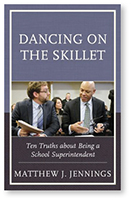 Dancing on the Skillet: Ten Truths About Being a School Superintendent
Dancing on the Skillet: Ten Truths About Being a School Superintendent
by Matthew Jennings, Rowman & Littlefield, Lanham, Md. 2021, 94 pp., $50 hardcover, $25 softcover
Dancing on the Skillet: Ten Truths About Being a School Superintendent provides insights into the challenges that face modern superintendents, ranging from unrealistic expectations, leading people who are difficult to lead and having “bosses” who do not have expertise in education. Matthew Jennings shares anecdotes and provides a raw perspective on just how hard it can be to be effective in complex organizations and communities.
But the book is not all doom and gloom. Rather, it is a somewhat balanced collection of pitfalls and perils of being the top leader. It ends with a positive statement on how impactful an effective superintendent can be on a community and school system.
This easy-to-read book would be appropriate for an aspiring superintendent program or an educational leadership graduate class geared towards candidates who are considering the superintendency. While many superintendents go into the position with unrealistic expectations of smooth sailing with board members, employee groups and community members, this book helps provide balance to the conversation. Certain to spark conversation, it provides an interesting perspective and a glimpse backstage into the challenges facing some superintendents.
Reviewed by Elizabeth Freeman, director of professional development and programs, Community Unit School District 300, Algonquin, Ill.
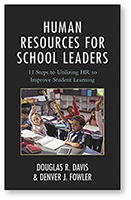 Human Resources for School Leaders: Eleven Steps to Utilizing HR to Improve Student Learning
Human Resources for School Leaders: Eleven Steps to Utilizing HR to Improve Student Learning
by Douglas R. Davis and Denver Fowler, Rowman & Littlefield, Lanham, Md., 2020, 168 pp., $60 hardcover, $30 softcover
Human Resources for School Leaders was somewhat unusual that it did not provide an array of possible interview questions nor did it focus on the training of employees when participating in group interviews. The term used throughout the book was HRD (Human Resource Development).
Douglas Davis is an associate professor and director of doctoral programs in K-12 leadership at the University of Mississippi while Denver Fowler serves as an associate professor of educational leadership and policy studies at Southern Connecticut State University. Both have worked as administrators in the public schools.
The book consists of 11 chapters, most of which had a case reflection with a set of prompt questions I felt was useful. Much of the focus was on the wise use of financial resources and the expense of HRD.
While I agreed with most views, the book slanted toward larger school systems and did not consider that the average school system size in the United States is between 3,000 and 4,000 students. Also, some of the calculations of cost focused on the money spent and not the benefits. For example, in chapter 2, the authors state the cost to educate a child was $11,000. Should a child be retained, it costs an additional $11,000.
As a former principal and superintendent, I would maintain promoting a struggling student would be more expensive because of future remediation expenses, possible increased discipline issues, and perhaps eventually dropping out of school is much more expensive.
The authors state the cost estimate of replacing a teacher in a large district is between $5,552 and $12,088 and that 13 percent of the teachers change schools or leave the profession each year. They stressed the importance of good recruiting, retention and induction programs as important ways to retain. Good leadership in the school is recognized as the most important piece in teacher satisfaction.
While it is important to retain teachers, it would have been nice to emphasize the importance of removing ineffective teachers since students are the ones who suffer when receiving poor instruction. It is costly, but well worth the time, effort and cost.
Overall, the book provides a sensible, analytical and technical look at human resources development and recognizes it as the guiding force in school improvement and student learning.
Reviewed by Paul A. Shaw, director of educator ethics, Georgia Professional Standards Commission, Martin, Ga.
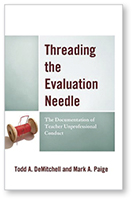 Threading the Evaluation Needle: The Documentation of Teacher Unprofessional Conduct
Threading the Evaluation Needle: The Documentation of Teacher Unprofessional Conduct
by Todd A. DeMitchell and Mark A. Paige, Rowman & Littlefield, Lanham, Md., 2020, 84 pp. with index, $50 hardcover, $25 softcover
Threading the Evaluation Needle addresses both the legal and professional knowledge a school administration team member should use to guide them through the structures and processes of employee evaluation, including discipline and dismissal within the public school system.
Authors Todd DeMitchell and Mark Paige rely on their combined expertise, both legal and education, to provide easy to use templates and exemplars for the varied documentation a school-based administrator needs to properly document the performance of teachers and school staff.
The book’s 10 commandments and toolbox documents within the appendix both provide valuable, easy-to-use strategies and reference tools for administrators at any level or experience.
At the forefront of the book’s message, the school’s community holds the school leader accountable for the ethical evaluation process of staff and seeks to ensure that the leader understands that it is the key to setting the tone for the establishment and continued maintenance of the culture within the building.
This book emphasizes the principle that supervision of school staff requires the school leader to prioritize instructional supervision while ensuring accountability processes held by the school leader are led with integrity. An essential part of this integrity is the maintenance of confidentiality and ensuring that students are at the center of decision-making process.
Reviewed by Tammy Caraker, associate superintendent of school and district operations, Collier County Schools, Naples, Fla.
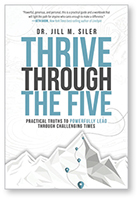 Thrive Through the Five: Practical Truths to Powerfully Lead Through Challenging Times
Thrive Through the Five: Practical Truths to Powerfully Lead Through Challenging Times
by Jill M. Siler, Dave Burgess Consulting, Inc., San Diego, Calif., 2020, 248 pp., $24.95 softcover
We have the most amazing jobs, leading and learning in schools. Ninety-five percent of what we get to do is fun, inspiring, impactful, purposeful and great for kids. Jill Siler, superintendent of Gunter ISD in Texas, has put together this practical resource Thrive
Through the Five: Practical Truths to Powerfully Lead Through Challenging Times to help us get through the other 5 percent.
This book would make an excellent gift for an aspiring superintendent or someone who has landed their first superintendent position. For veterans, it has practical applications that will make you think about how you deal with the difficult times. The chapter Engaging Around Contentious Issues is worth the price of the whole book and will benefit anyone, regardless of experience.
Each chapter ends with a summary of “5 Tips to Thrive” and a sketch note of the chapter, helping to synthesize the information. In addition, a “Framework to Thrive” is a great graphic organizer that can be used for notes, reflections and action steps.
In a year that has brought more than the 5 percent of difficult times, Siler provides the important reminder that “Leadership is not about you. It’s about how to best love and support those you serve.”
Reviewed by Nancy Wagner, superintendent of River Trails School District 26, Mt. Prospect, Ill.
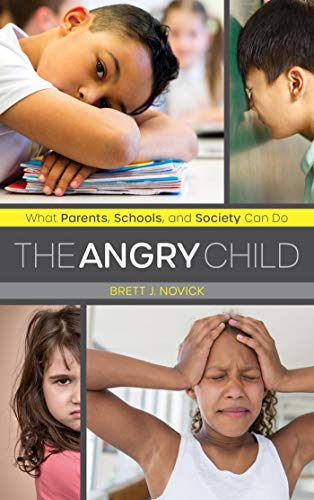 The Angry Child: What Parents, Schools and Society Can Do
The Angry Child: What Parents, Schools and Society Can Do
by Brett J. Novick, Rowman & Littlefield, Lanham, Md., 2019, 90 pp. with index, $27 hardcover
Anger is a powerful and often destructive emotion when it is not dealt with adequately. Our current society is plagued by an increase in violence and this has a clear impact on a child’s education, his/her social emotional growth and future life. In
The Angry Child, Brett Novick seeks to teach children how to harness their anger into a positive force that will develop assertiveness skills and provide fortitude for future success.
Novick is a licensed marriage and family therapist, state certified school social worker and educational administrator. He has authored many works around mental health and its impact on family and educational experiences. Novick uses his knowledge and experience in the behavioral sciences to illustrate how to deal with various manifestations of childhood anger. While focusing a great deal on parental best practices, Novick’s ideas can be easily transferred to the classroom, thus providing a common language and practice for parents and educators to work on together.
The book begins with an overview of the factors that contribute to anger in youth, such as the inability to deal with rejection and or consequences, a lack of social skills and the influence of social experiences. Children are not born knowing how to sort through their impulses and reflect on the effect of their actions. The book continues to discuss developing a sense of responsibility, resolving conflict (peacefully) and finding the root causes of a child’s anger.
Novick’s book may be best suited to parents and novice teachers; however, it could be used as a resource for a series of primary grade parent evenings or as a tool for school personnel to address specific issues with parents of struggling students. Ideas could be shared such as how to offer their children choices, the need for routines and failure versus growth. As educators we know the importance of working with parents as a united front supporting each’s efforts for the growth of the student.
The Angry Child deals with a specific aspect of the social emotional growth of children. The pandemic has made many more people aware of need for mental health support and awareness for children and adults. Novick gives basic information about the possible causes for childhood anger and ways to help our students process this emotion and respond in a way that will reduce violence in children and adults.
Reviewed by Edythe B. Austermuhl, superintendent, Berlin Township School District, West Berlin, N.J.
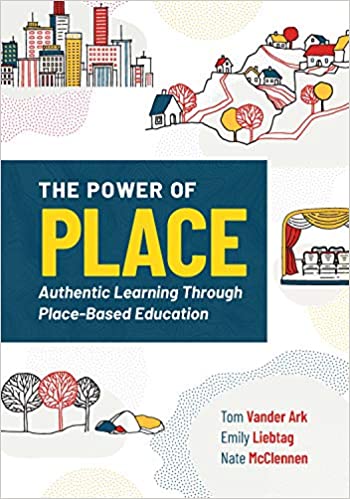 The Power of Place: Authentic Learning through Place-Based Education
The Power of Place: Authentic Learning through Place-Based Education
by Tom Vander Ark, Emily Liebtag and Nate McClennen, ASCD, Alexandria, Va., 2020, 156 pp., $27.95 softcover
Tom Vander Ark and his co-authors describe the power of place as “that moment when we are fully alive; where the sights, sounds, and smells of an experience stopped us in our tracks; when learning was organic and visceral.” Then they walk the reader through the experiences at more than 20 educational institutions that create that power in their schools or even more likely in their communities.
Although each case is unique, there are six principles that appear again and again in the case studies of
The Power of Place and lead to authentic learning: community as classroom, learner-centered, inquiry-based, local to global, design thinking and interdisciplinary.
Each of those principles has been the focus of full books before, but the combination of principles gives added strength to the cases studied. Special attention goes to developing a deep inquiry-based approach with the classroom as community with internships and active involvement beyond school walls. The schools studied are diverse with urban and rural, public and private settings. As students get directly involved with local issues, “they see that they are valued members of the community, and they also begin to see the role they could play as adults.”
Tom Vander Ark, the first executive director of education at the Bill and Melinda Gates Foundation, serves as CEO of Getting Smart, an organization that advises school districts, educational networks and foundations on implementing the key factors for success found in this and other books he has authored or co-authored.
Emily Liebtag is the director of Getting Smart. A former Title 1 elementary teacher, she specializes in leveraging the ideas of others to develop transformational learning experiences. Nate McClennen taught math and science at the secondary level and science at the university level before becoming the leader of the Teton Science Schools in Wyoming.
Reviewed by Bob Schultz, former district superintendent, Davis, Calif.